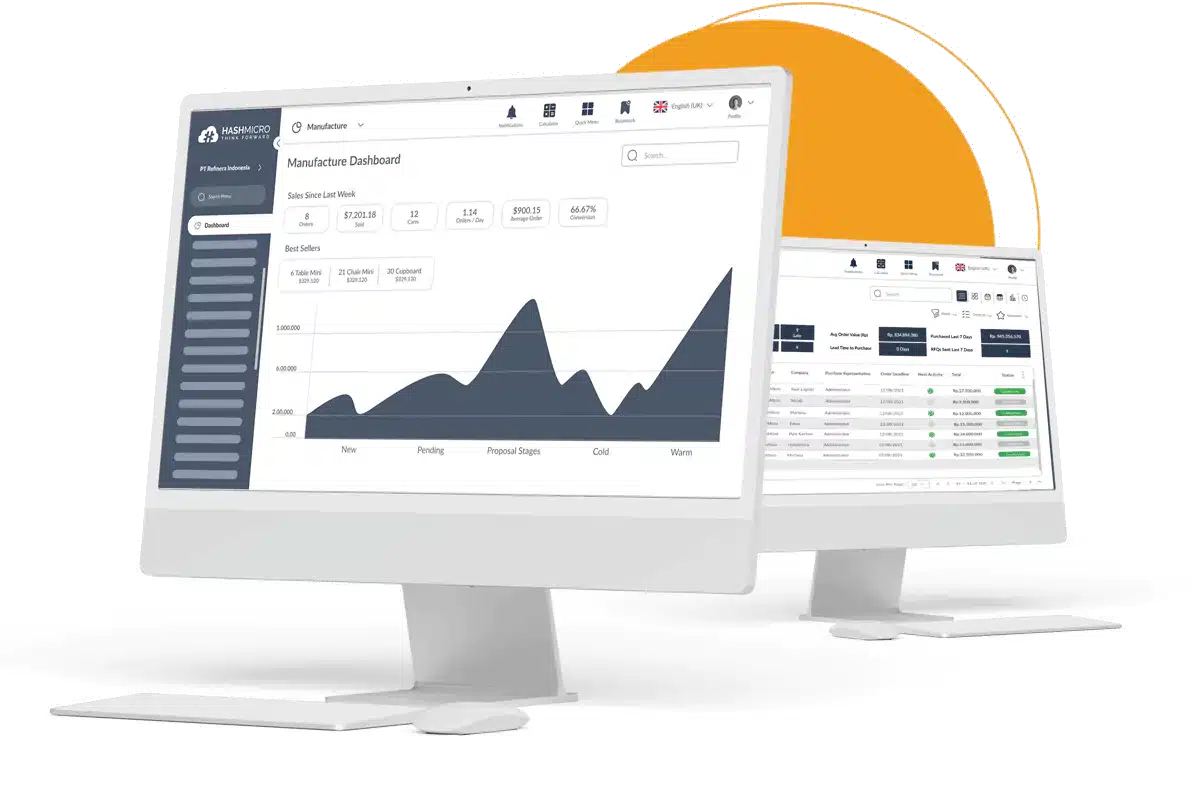A welding ERP system is a specialized software solution designed to manage the operations of welding and fabrication businesses. It integrates processes such as inventory management, job costing, scheduling, and quality control into a single, unified platform.
Managing a welding business with a manufacturing ERP system helps streamline complex workflows. From tracking welders’ certifications to automating material planning, it boosts efficiency and accuracy.
Nagtataka kung paano malulutas ng ERP ang mga tunay na hamon sa katha? Keep reading to explore features, benefits, and real-life applications tailored for welders and manufacturers.
Table of Contents

Key Takeaways
|
What is a Welding ERP System?
A welding ERP system is a specialized enterprise resource planning software, specifically manufacturing software, designed for welding and metal fabrication businesses. It centralizes and automates key operations such as production planning, inventory tracking, job costing, quality control, and workforce management.
Unlike generic ERP systems, the welding ERP system is tailored to meet the unique needs of fabrication shops. It ensures real-time coordination across departments, improves efficiency, and supports compliance with welding standards and certifications.
Welding management software is used by fabrication shops, metalworking manufacturers, and industrial welding service providers. These businesses rely on ERP to manage complex workflows, ensure quality, and optimize resource allocation.
Key Features of Welding ERP Systems for Fabricators
Welding project tracking and quality software comes equipped with features tailored to the needs of fabricators and metalworking businesses. These tools are designed to improve visibility, coordination, and efficiency across every stage of the welding process. Key features include:
- Production planning & scheduling: Automates job scheduling to maximize machine and labor utilization.
- Inventory & material management: Tracks raw materials, consumables, and welding supplies in real-time, ensuring efficient stock control within the manufacturing warehouse.
- Job costing & quotation management: Calculates accurate project costs based on materials, labor, and time.
- Weld tracking & traceability: Logs every weld operation for compliance, safety, and quality audits.
- Quality control & inspection: Monitors weld quality through inspection checklists and defect tracking.
- Workforce & certification management: Manages welder certifications, training records, and skill assignments.
- Real-time reporting & dashboards: Offers insights into job progress, resource usage, and operational performance.
Benefits of ERP Integration into Welding Businesses
Integrating metal manufacturing ERP into welding businesses brings numerous advantages that directly impact productivity and profitability. Aside from automating tasks, here are the benefits that ERP integration offers.
- Improved workflow automation
ERP eliminates manual processes by automating job scheduling, inventory tracking, and reporting. For example, ERP can automatically schedule jobs based on material availability and worker skills, while also triggering reorders when inventory levels are low. - Enhanced inventory management
With real-time tracking of materials and consumables, welding businesses can maintain optimal stock levels. An example of this is ERP, which tracks inventory levels in real time and automatically triggers reorders when stock reaches predefined thresholds. - Increased efficiency & productivity
ERP systems streamline production, from planning to execution. For example, ERP automatically assigns tasks based on worker skills and project priority, reducing downtime and enabling employees to focus on high-value activities. - Better compliance & traceability
Welding businesses can track every weld, ensuring compliance with industry standards. To illustrate, metal manufacturing ERP logs every weld, including details such as welder certification and materials used. - Cost savings & profitability
ERP integration optimizes resources, reduces downtime, and minimizes manufacturing waste, helping welding businesses lower operational costs. It tracks job costs in real time, enabling price adjustments based on material usage, labor, and production time in particular. - Centralized data & real-time insights
ERP systems offer a single source of truth for all business data. For instance, ERP consolidates data from inventory, production, and sales into one platform, allowing managers to quickly assess job progress, material availability, and labor needs. - Scalability for growth
As your welding business grows, an ERP system scales with it. To give an example, as a welding business expands, the ERP system can easily integrate new production sites, track additional inventory, and manage more employees.
Managing Welders, Certifications, and Compliance
Welding management software streamlines workforce management by tracking employee roles, schedules, and performance. It ensures that each welder’s certification is up to date, automates renewal reminders, and stores records for easy access.
Additionally, ERP software for welder certification management plays a vital role in ensuring compliance with safety regulations and industry standards. By tracking and managing welder certifications, it simplifies audits and inspections, reducing the risk of non-compliance.
Example:
Manufacturing resource planning can automatically notify managers when a welder’s certification is nearing expiration, allowing them to schedule the necessary training or certification renewal before it expires.
It also tracks workers’ hours and safety compliance, helping prevent violations during audits and improving overall operational safety.
Improving Product Quality and Weld Traceability
A metal manufacturing ERP system helps improve product quality by enabling real-time monitoring of the welding process. It ensures that each weld meets industry standards and customer requirements by incorporating quality control checks and automated inspections throughout production.
Additionally, the system offers weld traceability by recording crucial information about each weld, such as the welder’s ID, materials used, and inspection results. It creates a detailed, easily accessible record for compliance audits, warranty claims, and ensuring the integrity of the final product.
Example:
If a defect is found in a finished product, the ERP system allows you to trace the specific weld responsible, along with the welder’s details and the materials used. It makes it easier to identify the root cause, take corrective action, and ensure similar issues don’t recur in future production runs.
Ensuring product quality and weld traceability is crucial for both compliance and customer satisfaction. Download our pricing scheme to see how our metal manufacturing ERP system can streamline these processes for your welding business.

Why Choose HashMicro Manufacture Software for Your Welding Business?
Managing a welding business can be a challenging endeavor. Therefore, having an integrated solution is crucial for success. In this regard, HashMicro stands out as the best ERP system for welding companies, offering seamless integration to streamline your operations and enhance efficiency.
HashMicro Manufacturing Software is the Philippines’ premier solution for fabrication businesses, especially welding, trusted by over 2,000 leading enterprises across Southeast Asia. It provides a robust system that helps optimize resource utilization by ensuring seamless manufacturing processes.
HashMicro’s prominent features include:
- Multi-level Bill of Material (BoM): Creates detailed lists of raw materials and components for complex products with multiple assembly levels.
- Comprehensive quality checks for production goods: Assesses materials, WIP, and finished goods based on both qualitative and quantitative criteria.
- Manufacturing subcontractor management: Tracks subcontractors’ performance, timelines, and work quality to ensure outsourced tasks meet specifications and quality standards.
- Materials Requisition/Purchase Planning (MRP): Automates material requisitioning and planning to ensure the right materials are available on time.
- Finished & rejected goods tracking report: Tracks finished and rejected goods to monitor production quality and identify improvement areas.
- Real-time moving production cost report: Provides up-to-date production cost insights, tracking labor and material expenses in real-time.
Conclusion
In conclusion, a welding ERP system is a comprehensive tool that unifies various welding and fabrication operations. It helps improve productivity, accuracy, and traceability across the production floor.
HashMicro Manufacturing Software provides an all-in-one solution specifically designed for welding businesses. With features such as job tracking, inventory control, and quality management, it streamlines daily operations.
Handa nang baguhin ang iyong negosyo sa welding gamit ang matalinong automation? Book a free demo with HashMicro today and see how our system works for you.

Frequently Asked Questions About Welding ERP System
-
How does the welding process work in manufacturing?
Welding is a fabrication method used to fuse materials, typically metals, by applying intense heat. Unlike soldering or brazing, welding melts the base metal, allowing it to bond with a filler metal. Once cooled, the joined materials form a strong, unified piece.
-
Which welding method is most commonly used in manufacturing?
Gas Metal Arc Welding (GMAW), also known as MIG welding, is the most widely used process in manufacturing. It operates with a constant voltage and direct current, making it ideal for tasks involving metal plates and large-diameter pipes.
-
Why is welding critical in industrial settings?
Welding plays a vital role in connecting metal parts, ensuring the strength and durability of manufactured products. Because of its importance, welding processes must be accurate, efficient, and safe to maintain product integrity.






















